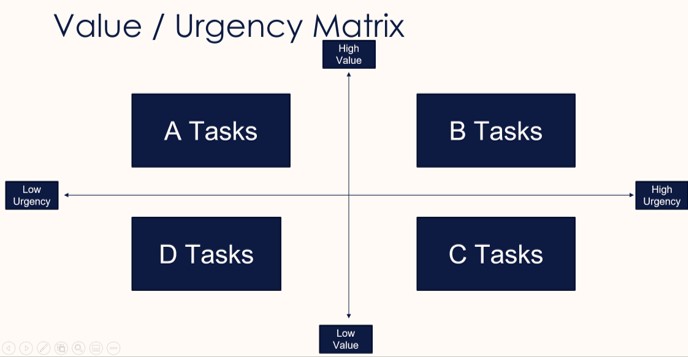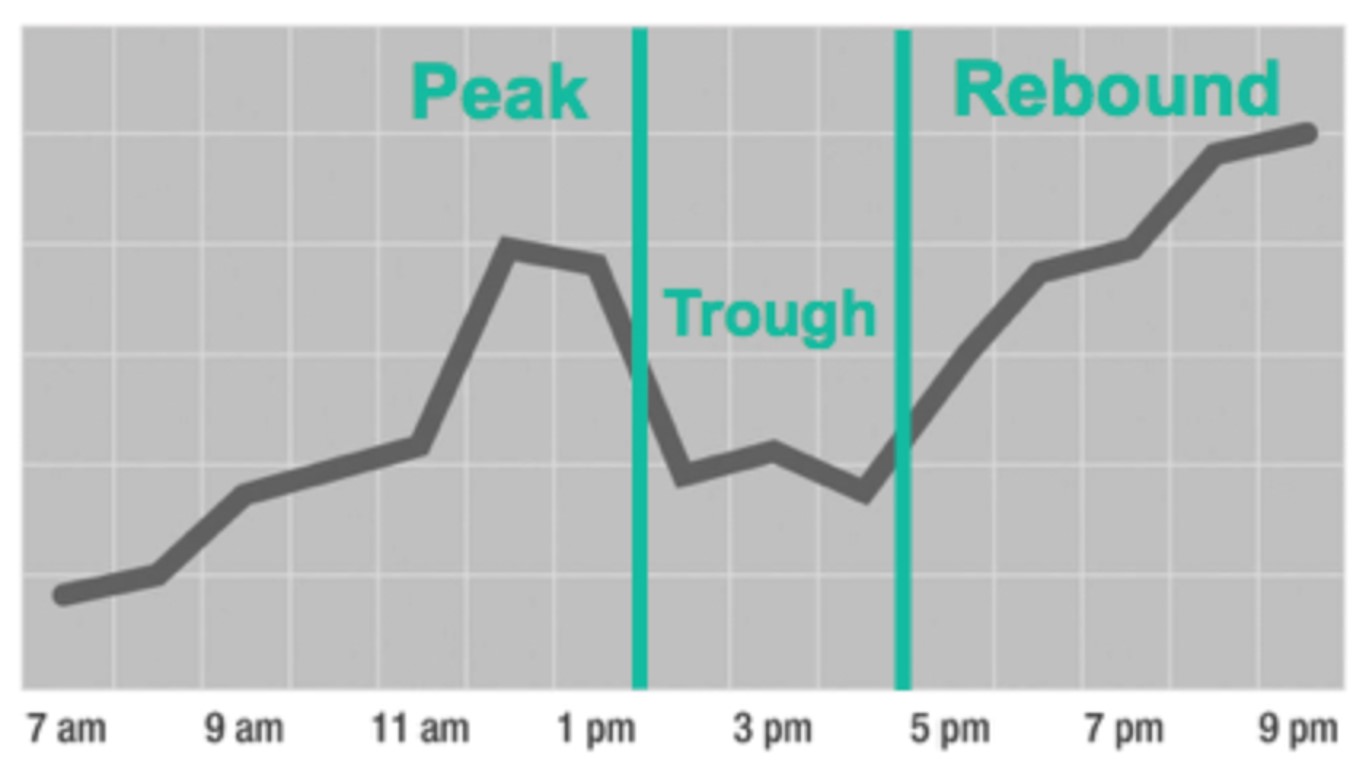
Five Time Management Adjustments to Support Your Business
As a small business owner, your most valuable resource is your time. That is because YOU are your most valuable asset.
Table of Contents:
Step 1: Prioritize Your Time Using the Value / Urgency Matrix
Step 2: Understand Your Unique Rhythm
Step 3: Implement These Five Time Management Adjustments
Number 1: Establish a morning routine
Number 3: Structure your calendar to support your biology and patterns.
Number 4: Respond to email once or twice per day
Number 5: Reduce low-value distractions (social media, news, YouTube, email)
Watch the video explanation on our YouTube channel:
In my coaching practice, I work with clients to think accurately, plan strategically, and act accordingly. The acting accordingly is where time management, your daily routine, and your prioritization of tasks becomes crucial. So we're going to focus on that particular section here.
Step 1: Prioritize Your Time Using the Value / Urgency Matrix
If you think about it, most early stage entrepreneurs are engaged in some form of trading time for money. You may be working to build a business you don't need to work in, but that often doesn't happen in the first three to ten years of your business.
Until then, how you prioritize your tasks and organize your day will make or break the success of your business.
As a business owner, how you invest your time is one of the most important disciplines and skills to develop.

Now, the first thing I have my clients start to identify is how they're currently investing their time. If you look at this concept on an X-Y chart (see above), you can see that there are high value tasks on the top, low value tasks on the bottom. And along the X-axis, there are high urgency tasks, and there are low urgency tasks.
What counts as an urgent task?
High urgency means that there will be a consequence, today or tomorrow if you don't do this task. And obviously, the value of any task can be subjective. But the skill of being a business owner is discerning what is the appropriate investment of your time, or your team's time, that is what you're converting into money is time. You're converting your talents, your skill, your energy into your financial success. So choosing how to invest your time is crucial.
Now I do some very basic prioritization here based on how I believe business owners actually build success and how I observed building success in my own business.
A-Rated Tasks: High Value / Low Urgency - The Strategic Actions
A-rated tasks are actually the tasks are the high value tasks that have a low urgency. This can include things like building a new website, developing new products or developing a new service for your clients, or launching an entirely new line of products for your consumers.
No one is going to come along and reprimand you for not getting this done today or tomorrow. It's always the thing that you can procrastinate on in your business. These tasks don't have a sense of urgency like distractions or true emergencies have in your life. So I recommend focusing on putting these tasks into your schedule.
Examples of A-Rated Tasks:
- Launching a new website
- Developing a new product or service
- Conducting customer research and interviews
- Researching competitors or important changes in your industry
- Planning a 6-week marketing campaign
B-Rated Tasks: High Value / High Urgency - Pays the Bills
If someone wants to hire you, getting them an invoice and getting paid is a high value and urgent task. Most business owners are not focused on A or B-rated tasks. High Value / High Urgency tasks are the immediate actions that are making your business operate and survive. If you stop doing these tasks your business will likely grind to a halt in the next few days or weeks:
Examples of B-Rated Tasks:
- Processing clients invoices
- Meeting with clients or customers
- Attending a tradeshow or marketing event
- Executing a marketing campaign
C- and D-Rated Tasks: Low Value Tasks - The Distractions and Interruptions
Now, to be honest, most small business owners (myself included) get trapped focusing on the bottom quadrants. An urgent, low-value task creeps up on you that you've known you've had to deal with for a while, and you've been putting off and putting off and now all of a sudden, your car registration is due or your driver's license has expired.
Or perhaps you have a colleague or someone on your team who always has an emergency, but it's not strategically valuable to the business or to you succeeding in your company.
Low urgency, low value tasks, if possible, should be ignored Sometimes a low urgency/low value task will move from the bottom left to the bottom right and all of a sudden become urgent. So, if it can't be ignored entirely you will need to plan for it or delegate the task.
Examples of Low-Value Tasks:
- Email interruptions
- Renewing your car registration
- Filing your tax return
- Checking social media
Recommendation: I recommend you start filtering your tasks through each day how you're investing your time.
- Are they high valuable, or are they low value?
- Are they are you responding to urgencies and emergencies?
- Or are you being proactive in what you're selecting to take on.
Step 2: Understand Your Unique Rhythm
In in Daniel Pink's book When, it was noted that there is a natural rhythm to our productivity. There is a natural rhythm to our mood, and to our emotions throughout the day. Across many different surveys and data sets this same pattern was observed.

This peak-trough-rebound is the common pattern for people throughout a working day. Most people peak up in the late morning, after you've eaten, taken care of yourself, got enough sleep, and maybe exercise. Then you usually hit a trough usually in the afternoon. That's when a lot of caffeine or other kind of indulgences start to come out to get you through that trough, and then you rebound in the evening.
You may have noticed this in your own life, the chart may look different based off of your own schedule and routine. Personally, my peak is actually around 10am, or maybe even a bit earlier, and I trough out right at the middle of the day and rebound again.
If you're going to be successful as an entrepreneur you need to take responsibility for this. Be discerning when selecting what tasks you're going to take on the during the peak. Don't keep putting tasks that you don't want to do in the trough and expect that they're going to get done.
Step 3: Implement These Five Time Management Adjustments
Here are five top time management adjustments that my clients often put in place.
Number 1: Establish a morning routine
The first and most important is to establish a morning routine. I'm a big fan of setting up your morning for success. Because the first 60 to 90 minutes of your day is usually when there's a lot of mental acuity, you're feeling good. Hopefully you've slept well. And you're ready to work. So establishing a morning routine that launches you into your workday is so critical. And that often then bleeds back into the previous day about what your evening routine is. So those go together establishing a morning routine. This doesn't mean you need to become an early riser. If your morning routine starts at nine or 10am, that's fine. But as long as you have a routine to start your day before that first block of your of your day starts.
Number 2: Eat the Frog
Complete on your highest value task in the first 90-minutes of your work-day. This psychologically has you experience a win to start the day, instead of being buried by the email that you've got or overwhelmed by social media posts or other conversations they're being you're reacting to taking on something proactively in the first chunk of the day will make a huge difference in your productivity overall.
Number 3: Structure your calendar to support your biology and patterns. Take breaks often. Observe your rhythm.
You should also structure your calendar to support your biology patterns. Take breaks often observe your own rhythm. There is a common misconception out there that you should just work harder, sleep less. That just leads to burnout which leads to an unsustainable style of working. You need to be responsible for your needs throughout the day, throughout the week, month and year.
Owning a business is a marathon, not a sprint. If you're going to have your own business you need to take care of yourself - your most valuable asset.
Number Four: Respond to email once or twice per day
Another big recommendation that my clients take on is to respond to email once or twice per day. Now if you let that sink in, you might notice that your pattern around email, or perhaps social media is not once or twice a day, it's once or twice an hour or once or twice every 10 minutes. You constantly have your email open and it's pinging you every single time and you're constantly checking it, turn that email off, turn off send receive if you can, and let emails batch into you at around 11am and then again at 3pm and respond to emails in those two time periods. You will notice that there wasn't that big of a consequence for you waiting all the way till 11am to respond to emails, do it. It's a game changer for how you are productive and proactive with your business.
Number Five: Reduce low-value distractions (social media, news, YouTube, email)
And fifth and finally, reduce low value distractions. So if the first thing you do in the morning is check social media, check the news check YouTube, check your email, take a break, turn that off and swap that out with some other aspect. Have your morning routine and have the discipline to put your phone down, flip it upside down, even put on limits of how many times you can open or look at an app or what time you can. There's a lot of tools in your phone to support you there. Don't let social media bleed out your productivity throughout the day. You have to grab a hold of your own schedule, and actually do something about leaning in and being proactive with your time management.
If you apply just a few of these time management adjustments, I promise you're going to notice several more hours in your day freeing up you'll be focusing on more valuable tasks and your business will succeed and flourish as a result.
Did you like this article? Get the latest personal finance articles from Vibrant Money by subscribing to our weekly newsletter!
Enter your email address below to sign-up.
We will never sell your information, for any reason.










